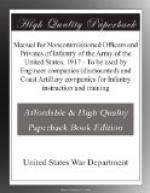“The discipline which makes the soldier of a
free country reliable in battle is not to be gained
by harsh or tyrannical treatment. On the contrary,
such treatment is far more likely to destroy than
to make an army. It is possible to import instruction
and give commands in such manner and in such tone
of voice as to inspire in the soldier no feeling but
an intense desire to obey, while the opposite manner
and tone of voice can not fall to excite strong resentment
and a desire to disobey. The one mode or the
other of dealing with subordinates springs from a corresponding
spirit in the breast of the commander. He who
feels the respect which is due to others can not fail
to inspire in them regard for himself, while he who
feels, and hence manifests, disrespect toward others,
especially his inferiors, can not fail to inspire
hatred against himself,” (Addressof_Maj._Gen._John_M._Schofield_
tothe_United_States_Corps_of_Cadets,_Aug,_11,_1879._)
When, by long-continued drill and subordination, you have learned your duties, and obedience becomes second nature, you have acquired discipline. It call not be acquired in a day or a month. It is a growth. It is the habit of obedience. To teach this habit of obedience is the main object of the close-order drill, and, if good results are to be expected, the greatest attention must be paid to even the smallest details. The company or squad must be formed promptly at the prescribed time—not a minute or even a second late. All must wear the exact uniform prescribed and in the exact manner prescribed. When at attention there must be no gazing about, no raising of hands, no chewing or spitting in ranks. The manual of arms and all movements must be executed absolutely as prescribed. A drill of this kind teaches discipline. A careless, sloppy drill breeds disobedience and insubordination. In other words, discipline simply means efficiency.
SECTION 5. MILITARY COURTESY.
In all walks of life men who are gentlemanly and of good breeding are always respectful and courteous to those about them. It helps to make life move along more smoothly. In civil life this courtesy is shown by the custom of tipping the hat to ladies, shaking hands with friends. and greeting persons with a nod or a friendly “Good morning,” etc.
In the Army courtesy is just us necessary, and for the same reasons. It helps to keep the great machine moving without friction.
“Courtesy among military men is indispensable to discipline; respect to superiors will not be confined to obedience on duty, but will be extended on all occasions.” (Par.4,_Army_Regulations,_ 1913.)
One method of extending this courtesy is by saluting. When in ranks the question of what a private should do is simple—he obeys any command that is given. It is when out of ranks that a private must know how and when to salute.




